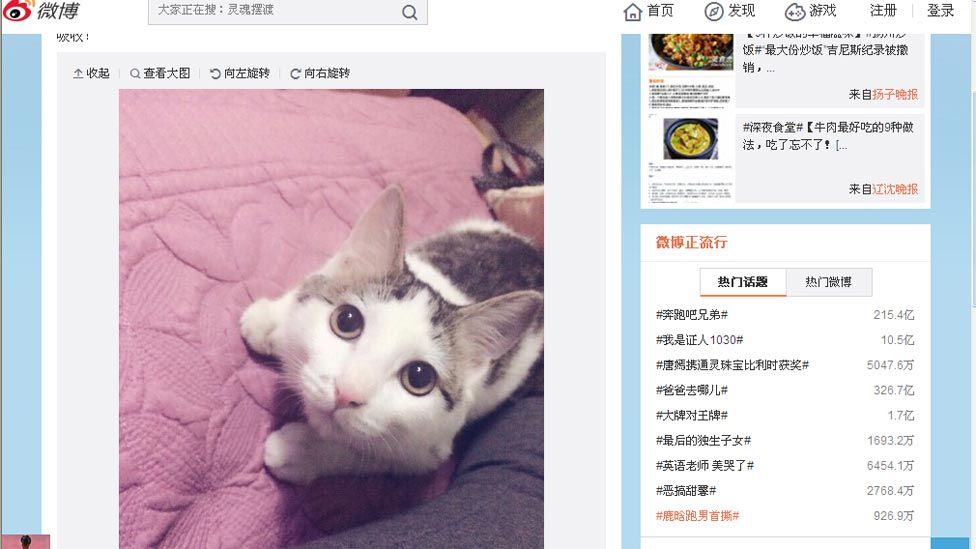Claws out over China cat meat scandal
- Published

Chinese social media users are buzzing with outrage at news that a "feline house" in Tianjin has been keeping cats to be sold for human consumption.
They have raised concerns over food hygiene and many have posted pictures of their own pets to raise awareness.
The country has already come under fire for a similar cat meat scandal and its annual dog meat festival.
Some activists are calling for these "terrible and prehistoric" customs to be dropped.
Eating cat meat is widely regarded as taboo in China, but it is still eaten in some rural regions.
Cages
On 28 October, popular regional daily The Beijing News reported that local police in the eastern city of Tianjin had found a "common courtyard house with more than 200 cats crowded into very small cages".
According to the report, "several villagers said that the 'feline house' had been leased to someone from outside the area for two to three years".
"We have often seen in the past cats being transported by vehicle, but we did not know what these people were doing," one villager said.
The news went viral after it was posted on the popular microblog Sina Weibo by influential papers the Yangtse Evening Post and Huaxi Metropolis Daily. Both said rescue teams had confirmed that the cats were to be shipped to Yunnan, Guangdong and Shandong provinces to be used as food.
The Huaxi Metropolis Daily's post was shared over 3,000 times and received thousands of comments from appalled social media users.
Hygiene worries
Within two days, the hashtag #CatMeatUsedForHamAndKebabs had become a Sina Weibo trend. Posts using the hashtag have reached more than nine million, and more than 5,000 social media users have actively used the hashtag to discuss the story.
Users appeared to be most concerned about food hygiene standards.
"I will never eat food from roadside vendors again," said Xiaocong Ban-Jiang, whose comment received more than 1,000 likes.
"What is happening to our country, why are there always problems with food and drink?" lamented Xiao Ruyi Jin Baozi in another popular post.
Weibo users across the country have been uploading pictures of their own pets in protest.
"You can't not love them; please do not hurt them. I hope you don't go to street vendors or unlicensed restaurants," Xu Xiao Piao wrote.
"I do not understand how some people cannot tell the difference between an animal companion and food," Xiaoyuan Zide Dream protested.
'Terrible and prehistoric'
State media reports say two men have been detained and that "the matter is under investigation".
This is not the first time that China has been the subject of animal food scandals.
In February 2014, The Beijing News reported that police had found cages containing stray cats in Beijing suburbs, and "traders claimed that they caught cats to be sold on as food".
The news prompted outrage among many social media users at the time.
China was also the subject of international criticism last June for going ahead with its annual Yulin Dog Festival in southern Guangxi province.
The event, which sees as many as 10,000 dogs slaughtered for meat, has also been increasingly criticised at home. In June, many users took to Sina Weibo to call for a permanent ban on dog and cat meat.
"We live in a civilised world; this is terrible and prehistoric," said LadyM_diary.
BBC Monitoring reports and analyses news from TV, radio, web and print media around the world. You can follow BBC Monitoring on Twitter and Facebook.
- Published22 June 2015
- Published1 June 2015
- Published22 June 2015